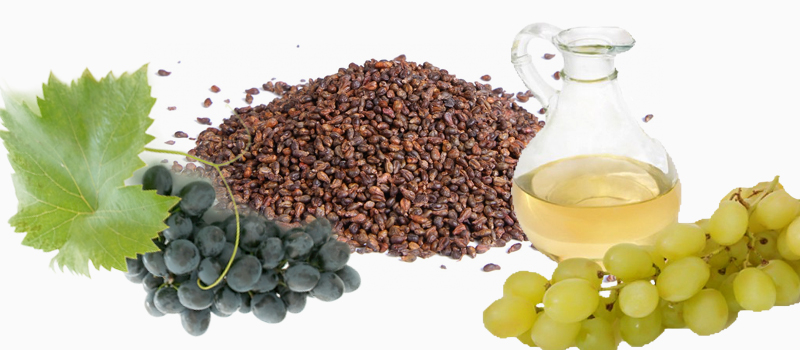Grape seeds have a high concentration of Vitamin E, flavonoids, linoleic acid, and OPCs. These compounds can also be found in lower concentrations in the skin of the grape. OPCs are also found in grape juice and wine, but in lower concentrations. Resveratrol is another of grape’s compounds which is related to OPCs and found mainly in the skins. Resveratrol has become very popular as an antioxidant and is being studied in connection with a variety of diseases.*
Contents
Uses
- The extract has been linked to a wide range of possible therapeutic properties including healing wounds and treating conditions such as high cholesterol, atherosclerosis, macular degeneration, poor circulation, nerve damage, as well as preventing cancer.
- Healing wounds: Grape seed extract can heal dermal wounds. A study, published in the journal Free Radical Biology and Medicine, “provided firm evidence to support that topical application of GSPE represents a feasible and productive approach to support dermal wound healing.”
- Improving bone strength: Including grape seed extract in your diet with calcium has a “beneficial effect on bone formation and bone strength for the treatment of bone debility caused by a low level of calcium,” according to research published in the Journal of Musculoskeletal & Neuronal Interactions.2
- Preventing skin cancer: Grape seeds contain proanthocyanidins which can prevent the development of cancer. A study, published in the journal Molecular Nutrition & Food Research3, found that grape seeds have properties that can reduce the severity of skin cancer. The researchers concluded that grape seed extracts “could be useful in the attenuation of the adverse UV-induced health effects in human skin.”
- Cardiovascular benefits: The antioxidants in grape seed extract can potentially protect the blood vessels from becoming damaged, which may prevent high blood pressure. According to one study, published in the journal Mutation Research/Fundamental and Molecular Mechanisms of Mutagenesis4, “grape seed proanthocyanidin extract (GSPE) provides superior antioxidant efficacy as compared to Vitamins C, E and β-carotene.”
- Reducing edema (swelling): Taking grape seed extract can help reduce the swelling that occurs after an injury or surgery. A double-blind, placebo-controlled study found that breast cancer patients who took 600 mg of grape seed extract every day for 6 months had less edema compared to those on placebo.
- Preventing cognitive decline: Grape seed extract is very high in proanthocyanidins (oligomers of monomeric polyphenols) which may prevent cognitive decline. One study identified “a critical role for grape seed proanthocyanidin extract (GSPE) as a neuroprotectant in the hippocampus and in preventing cognitive loss with aging.”
Benefits
- Treating tooth decay
- Protecting against pathogens
- Improving night vision
- Alzheimer’s disease
- Treating diabetic retinopathy and improving blood sugar control
- Relieving symptoms of chronic venous insufficiency
- Anti-aging properties (protecting collagen and elastin)
Cautions
- It is important to talk to your doctor before taking grape seed extract as it can affect the way that certain medications are broken down in the liver.
- It is possible that grape seed extract can act as a blood-thinner, which increases the risk of bleeding if taken along with anticoagulants such as warfarin or aspirin. According to RxList8, “Taking grape seed along with warfarin (Coumadin) might increase the chances of bruising and bleeding.”
- In addition, pregnant women should completely avoid taking grape seed extract supplements.
Common side effects include :
- Headache
- Dizziness
- Itchy scalp
- Stomach ache
- Nausea

